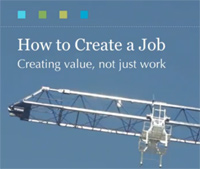 by Arthur Brooks –
by Arthur Brooks –
The 2012 presidential campaign is shaping up to be a battle of two economic philosophies. One favors a greater redistributive and regulatory role for the government; the other prioritizes the values of free enterprise, including private property, individual liberty and limited government. Given the economic hardships the United States has endured in recent years, it is tempting to conclude that free markets are no longer best for us — but that would misread our history, and buy into myths about the impact of free enterprise.
1. Free enterprise hurts the poor.
The Occupy Wall Street movement of 2011 and plenty of politicians would have us believe that the free-market system is a contest between the ultra-rich and everyone else (the “99 percent”). But in fact, there never has been a greater force for helping the poor than free enterprise. [Read more…]

 With unemployment still above 9 percent, Americans are searching for answers that will lead to quality, lasting jobs. Past failures of jobs programs show that addressing the symptom instead of the disease has yet to lead to real job growth.
With unemployment still above 9 percent, Americans are searching for answers that will lead to quality, lasting jobs. Past failures of jobs programs show that addressing the symptom instead of the disease has yet to lead to real job growth. by James E. Miller –
by James E. Miller – by IBD Editorials –
by IBD Editorials –